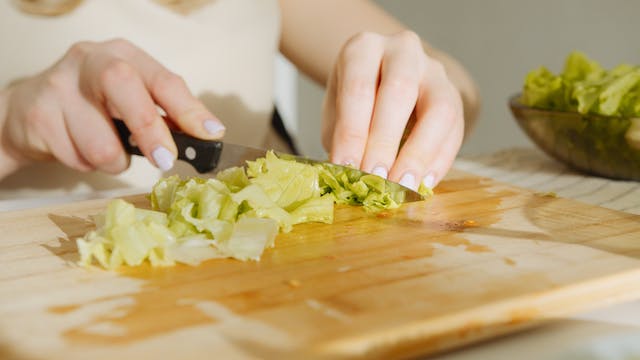Introduction:
Meet Dr. Charles Gerba, a distinguished microbiologist with a wealth of experience in food safety and kitchen hygiene. Dr. Gerba’s extensive knowledge has been instrumental in helping individuals create safer and more enjoyable kitchen environments. he shares invaluable insights on an often overlooked but critical aspect of culinary life cutting board care. Imagine your kitchen as a stage, and the cutting board as its unassuming star. This seemingly unremarkable surface is more than just a platform for slicing, dicing, and chopping; it’s a cornerstone of food safety and a canvas for culinary creativity.
Forgotten Hero of Your Kitchen
Your cutting board, a seemingly simple kitchen tool, plays a vital role in the safety and quality of your culinary creations. It’s not merely a flat surface for chopping, slicing, and dicing; it’s a cornerstone of food safety. Dr. Gerba’s expertise highlights the importance of this unsung hero and its care. A well-maintained cutting board prevents cross-contamination, enhances your cooking skills, and ultimately safeguards the health of your family and guests. Whether you’re a seasoned home chef or a beginner in the culinary world, understanding the nuances of cutting board care will elevate your kitchen game.

Understanding the Basics
One of the first decisions you’ll face when selecting a cutting board is the material. Each material comes with its own set of advantages and drawbacks. Dr. Gerba provides insights into the most common cutting board materials:
- Wood: Wooden cutting boards are popular for their natural look and knife-friendly surface. They’re gentle on your knives, which is great for blade longevity. However, they require regular maintenance to prevent moisture absorption and bacterial growth.
- Plastic: Plastic cutting boards are known for their easy cleaning and affordability. They can be conveniently placed in the dishwasher, making cleanup a breeze. Nevertheless, they are prone to scratches, which can harbor bacteria if not cleaned properly.
- Bamboo: Bamboo cutting boards are eco-friendly and naturally resistant to moisture. Their durability varies, so it’s essential to choose a high-quality bamboo board. Proper care can extend their lifespan.
Daily Maintenance
Maintaining a clean and safe cutting board is an ongoing responsibility. Dr. Gerba shares essential daily maintenance practices to ensure your board remains a reliable kitchen companion:
- Hand Washing: After each use, wash your cutting board with hot, soapy water. Scrub it thoroughly, especially if it’s been in contact with raw meat, poultry, or fish.
- Sanitizing: For added safety, sanitize your cutting board with a mixture of water and vinegar or a diluted bleach solution. Allow it to air dry.
- Drying Properly: To prevent moisture absorption and bacterial growth, make sure your cutting board is thoroughly dry before storage. It’s best to store it vertically to allow air circulation.
- Avoid Cross-Contamination: Designate specific cutting boards for different types of food. For example, have one for raw meat and another for fruits and vegetables to prevent cross-contamination.
Photo by Palabay: https://www.pexels.com/photo/board-close-up-cooking-cuisine-273813/
Deep Dive into Decontamination
For a deeper dive into cutting board care, consider these advanced decontamination techniques:
- Boiling Water: If your cutting board is made of plastic or glass, you can submerge it in boiling water for a few minutes to kill bacteria.
- Hydrogen Peroxide: Apply a solution of hydrogen peroxide and water to disinfect your cutting board. Rinse it thoroughly afterward.
- Baking Soda and Lemon: A mixture of baking soda and lemon juice can remove stains and odors from your cutting board. Apply the paste, scrub, and rinse.
- Mineral Oil: For wooden cutting boards, mineral oil can help maintain their condition. Apply a thin layer of food-grade mineral oil to prevent drying and cracking.
Cutting Board Longevity
Cutting boards can be a significant investment, and caring for them properly can save you money in the long run. Dr. Gerba provides tips on how to extend your cutting board’s lifespan:
- Rotate and Flip: To prevent uneven wear, regularly rotate and flip your cutting board.
- Use a Trivet: When placing hot pots and pans on your cutting board, use a trivet to avoid warping.
- Avoid Harsh Cleaners: Stick to mild dish soap and avoid harsh chemicals that can damage the cutting board’s surface.
- Resurface If Needed: Wooden cutting boards can be resurfaced to remove deep cuts and stains. This can breathe new life into an old board.
Creative Cutting Board Uses: Beyond Chopping
Your cutting board can be a versatile tool in the kitchen. Dr. Gerba reveals creative culinary uses that go beyond chopping:
- Serving Platter: Use a clean, well-maintained cutting board as a rustic serving platter for cheeses, fruits, or appetizers.
- Kneading Dough: The flat surface of a cutting board is excellent for kneading dough when making bread or pastries.
- Pounding Meat: Tenderize meat by placing it between two sheets of plastic wrap on your cutting board.
- Photography Background: Wooden cutting boards can serve as stylish backdrops for food photography.
Comparative Table
| Material | Pros | Cons |
|---|---|---|
| Wood | Natural, Knife-Friendly | Requires Care |
| Plastic | Easy to Clean | Prone to Scratches |
| Bamboo | Eco-Friendly | Durability Varies |
Conclusion:
our primary objective is to provide lifestyle and culinary enthusiasts with comprehensive knowledge on cutting board care, catering to their varying levels of expertise. Dr. Charles Gerba’s expertise serves as the foundation of this piece, offering scientifically backed advice and advanced techniques to safeguard your kitchen and enhance your culinary skills. Cutting boards are often underestimated but play a vital role in the safety and quality of your meals. By mastering their maintenance, you can ensure that your food is prepared safely and deliciously. offers practical advice, advanced tips, and in-depth insights, helping you unlock the full potential of your cutting board.










